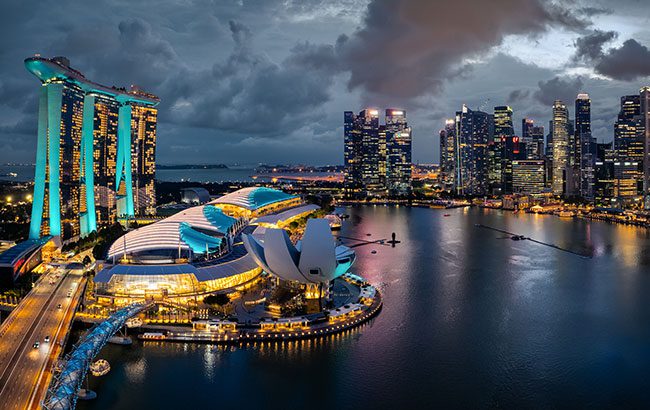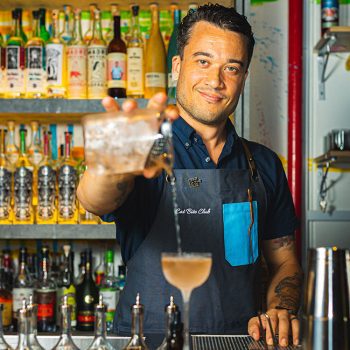Financial challenges put pressure on Singapore’s bars
Singapore’s once thriving cocktail scene is under severe pressure thanks to cultural shifts and a financial squeeze.

*This feature was originally published in the October 2025 issue of The Spirits Business magazine.
It was a rough start to 2025 for Singapore’s bar scene. As revellers toasted the New Year, Tippling Club – one of the city’s most acclaimed venues – was pouring its last drinks after almost 17 years.
Tippling Club gave no reason for its closure, but it soon became clear it was not an isolated case. In January, queer venues Tuckshop and Sausage Market closed, followed in March by Smoke & Mirrors at the National Gallery. In July, the Jigger & Pony group shut two concepts – Sugarhall and Rosemead – though a new project is promised in their place.
Perhaps the biggest shock came in July when the Singaporean arm of distributor Proof & Company went into liquidation. Tellingly, the business attributed its downfall to the closure of some of its longest‐standing partner restaurants and bars. The parent group continues to operate in Hong Kong and New Zealand, and its cocktail bar in Singapore, 28 HongKong Street, remains open. Additionally, its consultancy arm, Proof Creative, was unaffected, although in August, its creative director, Bobby Carey, left the business. “Proof & Company was the pioneer of fine drinking throughout Singapore and the rest of Southeast Asia,” says Carey. “But with rising costs, people are shifting away from craft because they’re worried about pour costs.”
He corroborates the company’s line about closures, but adds that the problem goes beyond hospitality, with Singapore losing both its biggest independent cinema and commercial cinema in recent months.
“There are a lot of cultural shifts happening in Singapore, which is sad to see,” he says. “There’s the dissolution of these third and fourth spaces, which is tough, especially for the younger generations.”
Yet Carey is backing hospitality, launching a consultancy called Studio Ryecroft. “There’s an optimism and a pessimism at the same time,” he says.
The sector’s biggest challenge, according to its operators, is rent. “There’s no rent control here,” says Christina Rasmussen, co‐owner of Fura bar. “Landlords would rather sit on an empty property than lower prices.”
Jesse Vida, co‐founder of Cat Bite Club, adds the sector is bugged by short leases and sudden rent hikes: “If you build a venue for SG$400,000 (US$312,037) and your rent jumps 40% two years later, your business will fail and you lose money.”

The issues caused by increased rent aren’t just affecting businesses. “There are just fewer people out and about,” says Vida. “I think a big part of that is because domestic rent skyrocketed post‐Covid.”
Changing consumer habits are another challenge. Whether forced by budgetary issues or simply because they’d rather stay in, many people in Singapore are shunning the on‐trade. “The new generation prefers to stay in, as a night out can easily cost upwards of SG$150 when you factor in drinks, transport and supper,” says Lee Rosli, co‐founder of Casper cocktail bar in Duxton Hill.
Finding qualified staff is an issue faced by the bar sector all over the world, but one problem that is uniquely Singaporean is the government’s regulation of foreign workers. Foreigners make up around 40% of the country’s workforce, but the Ministry of Manpower enforces a quota on the number of foreigners working in a business, dependent on industry and size. For hospitality, only 35% of a business’ workforce can be non‐Singaporean.
Ultimately, the quota aims to protect work opportunities for native Singaporeans, but Vida points out that this only works if they are willing to take on these jobs. “There is still a negative stigma for many Singaporeans around working in bars,” he says. “There are many foreigners who would love to have these jobs, but the quota is very restrictive.”
Carey argues that talent is simply shifting elsewhere. “Singapore has always been a bastion of drinking in Southeast Asia,” he says. “It’s risen the tide for everywhere else around Southeast Asia. A lot of people who worked in Singapore have moved back to their home countries – and now they’re working at a lot cheaper rate. It’s great to see how Southeast Asia is growing, but for Singapore, it’s definitely changed.”
Restrictive rules
Operators also point to restrictive licensing and alcohol rules, many of which were tightened during Covid‐19. “For cocktail bars in particular, your Monday hours are 9pm to 1am or 2am. Most of us only have a midnight licence,” explains Vida. There are also rules about where and at what times people can drink, both inside venues and out, adds Rasmussen. “This prevents nightlife from thriving because the cut‐off is so strict.”
Carey believes the government could reduce alcohol duty. “Maybe this is from having worked in a distribution company, but if that tax goes down, we can sell spirits cheaper, which has a knock‐on effect the whole way down,” he says.
There are signs, however, that change may be on the horizon. In August, the government extended trading hours in Clarke Quay and neighbouring districts until 4am on weekends and public holidays. “It gives hope that our area might be next,” says Rosli.

Carey is cautiously hopeful, too. “The Singapore government see what’s going on. They’ve been well aware of what’s been happening for the past nine months. There have been a lot of closures. I think someone will help fix that. They’re still proud of Singapore being the little cocktail country.”
For some, that pride offers enough optimism. “The community here always has something to offer,” says Rosli. “It’s about adapting to survive, and Singapore’s cocktail scene isn’t going anywhere.”
Others, however, take a more cautious view. For Rasmussen, the path forward depends on structural reform. “We’re all very concerned about the future of the F&B scene here, because it seems the only solution is for the authorities to step in and help revitalise an industry that is a pillar to Singapore’s tourism and economy,” she says.
“Singapore is still a good market – but it’s no longer a great market as it was up until 2020,” adds Vida, who moved to Singapore in 2018 to head up Atlas. “I am optimistic we will see at least a slight uptick from the end of this year into 2026. The sad reality is that a dining and drinking scene that was once the crown jewel of Asia is losing its relevance. We adjust, we push on, and we will continue to try and work towards the best future we can as bar operators in Singapore.”
Related news
New Singapore bar offers some of the world’s rarest whiskies
